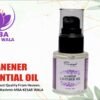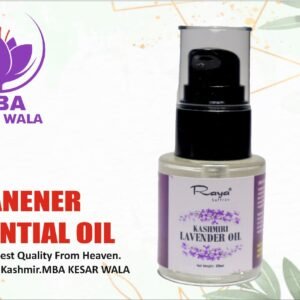
Walnut Oil
₹363.00 N/A
Walnut Oil
1) What is Walnut Oil
Walnut oil is a natural oil extracted from walnuts (Juglans regia). It is usually cold-pressed to preserve the nutrients and is known for its rich flavor and numerous health benefits. It is commonly used in culinary dishes, skincare products, and natural remedies.
2) How to Select Walnut Oil
Cold-pressed: Choose cold-pressed or unrefined walnut oil for maximum nutritional benefits.
Freshness: Ensure the oil is freshly packaged and hasn’t been stored too long, as walnut oil tends to go rancid quickly.
Dark Glass Bottles: Opt for walnut oil packaged in dark glass bottles to protect it from light, which can degrade its quality.
Organic: If possible, select organic walnut oil to avoid exposure to pesticides.
3) Benefits of Walnut Oil
Rich in Omega-3 Fatty Acids: Walnut oil contains high levels of ALA (Alpha-Linolenic Acid), a type of omega-3, which supports heart health and reduces inflammation.
Antioxidant Properties: It is a good source of antioxidants, such as vitamin E, which help fight free radicals and protect the skin from damage.
Improves Brain Health: Omega-3s in walnut oil are beneficial for brain function and mental clarity.
Skin Benefits: Walnut oil is often used to moisturize the skin, reduce fine lines, and treat skin conditions like eczema.
4) Packaging Size Available
Walnut oil is commonly available in:
2ooml bottles: For personal use, especially in skincare or small culinary use.
5) Use
Culinary: Used as a finishing oil for salads, drizzled over cooked vegetables, pasta, or meat. It is not ideal for high-heat cooking as it has a low smoke point.
Skincare: Applied directly to the skin or mixed with other oils/lotions to moisturize, soothe irritation, and treat acne or aging skin.
Massage oil: Walnut oil can be used in massages due to its soothing properties.
Hair Care: Walnut oil is used to promote scalp health and nourish hair.
6) Health Benefits by Age/Gender
Men: Walnut oil promotes heart health by reducing cholesterol levels and boosting circulation, and may also support testosterone production.
Women: The omega-3s help balance hormones, and the oil’s antioxidants may protect against aging skin.
Kids: Supports brain development and cognitive function, especially beneficial due to its omega-3 content.
Elderly: Walnut oil can improve cognitive function, heart health, and joint mobility in the elderly, helping reduce inflammation and promoting overall wellness.
7) Taste
Walnut oil has a rich, nutty flavor with a slightly bitter undertone. It’s often described as earthy and savory, making it an excellent addition to dishes where a subtle nut flavor is desired.
8) How to Consume
Culinary: Drizzle over salads, roasted vegetables, or pasta. Use it as a finishing oil to preserve its nutritional content.
Supplements: Take 1-2 teaspoons daily as a dietary supplement.
Skin Application: Apply a small amount directly to the skin for hydration and to reduce inflammation.
Hair: Massage a few drops into the scalp or mix with hair products.
9) How to Store
Cool, Dark Place: Store walnut oil in a cool, dark place, away from light and heat to prevent it from turning rancid.
Refrigeration: It is recommended to refrigerate the oil after opening to prolong its shelf life.
Airtight Bottles: Ensure the bottle is tightly sealed to prevent exposure to air, which can cause oxidation.
10) Product Life
Shelf Life: Walnut oil typically has a shelf life of 6 to 12 months. However, once opened, it should be used within 3-6 months for maximum freshness.
Harvesting Time: Walnuts are usually harvested in the fall (September to November). The oil is then extracted from dried walnuts and immediately bottled to preserve its freshness.
After Harvest: The walnuts are cracked, and the oil is extracted through pressing or solvent extraction, depending on the method.
Then After: The oil is filtered and packaged. Cold-pressed walnut oil, in particular, retains most of the walnut’s natural flavor and nutrients
| packaging | 1 Bottle |
|---|
Related products
Almond Oil
Apricot Oil
Lavender Essential Oil
₹363.00 N/A


₹483.00 N/A




Reviews
There are no reviews yet.